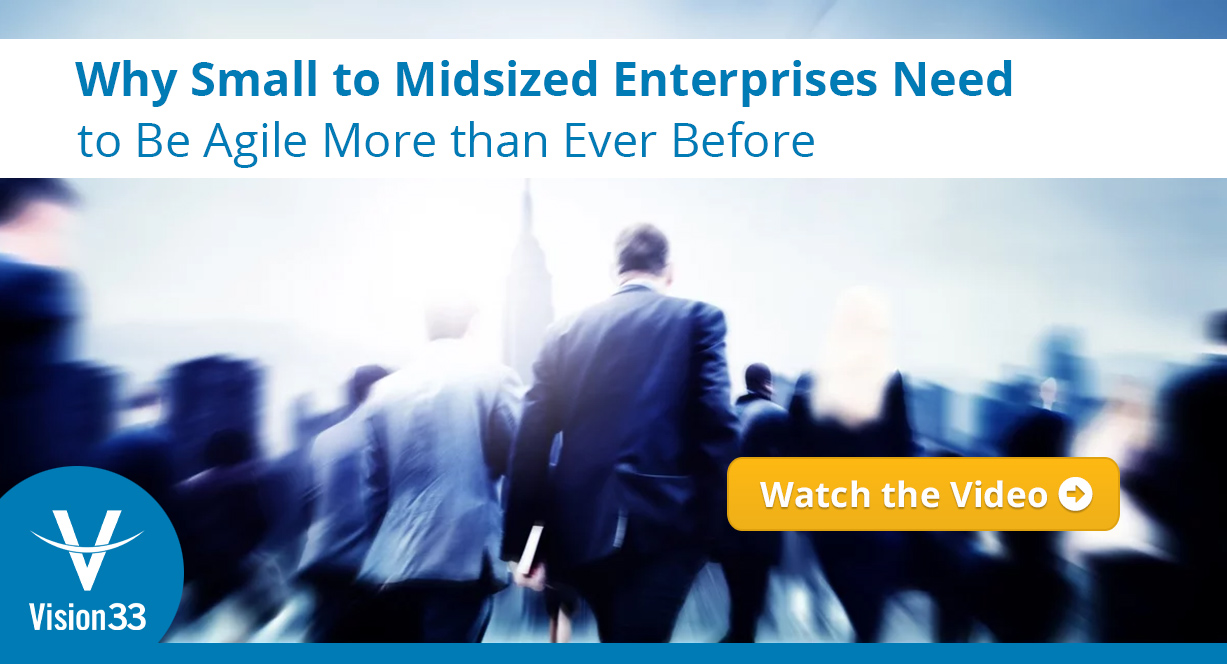SAP Business ByDesign vs. SAP Business One: Vision33 Compares Two ERP Giants
SAP Business OneChoosing the right ERP solution requires careful consideration. Explore SAP Business ByDesign...

May 17, 2018
Blog > Why Small to Midsized Enterprises Need to Be Agile More than Ever Before
SMEs operate in disruptive times which means the pace of change has accelerated as well. While change isn’t new, the increased pace is, and it's much faster than it ever used to be. Vision33’s Carl B. Lewis asked guest speaker Cindy Jutras, ERP researcher and president of Mint Jutras, during a recent webinar whether businesses today need to be more agile than ever before? Her answer was a resounding yes. Here's why.
When asked about the potential risk faced by industry disruptive, more than 54% of respondents of a Mint Jutras study agreed that the risk was medium to high. And for the 9% of respondents that believe there’s no risk at all, Cindy asked a question: How do you think the taxi industry would have responded to this question on the eve of the launch of Uber, ride-sharing service? And now today with the COVID-19 pandemic?
There are many examples of industry disruption, look to what digital photography did to the film industry or personal computing did to the corporate giants of yesteryear. It took decades for digital photography to put Kodak and Polaroid in jeopardy. But how long did it take Uber to disrupt the taxi industry? Today, disruption can happen overnight as it did with the Coronavirus.
Survey respondents also selected the source where disruption was most likely to come from in their industry. 19% said new and innovative products, but a larger percentage said new ways of selling and pricing existing products. Subscriptions to services for products such as the business software industry is a good example of the new business model. Instead of licensing a piece of software, businesses subscribe to a monthly service fee and thus reduce the total cost of ownership because they’re no longer responsible for managing IT, upgrades, or end of life product servicing. If new business models are often the source of the disruption, then it's technology that enables them.
Uber, Airbnb, Netflix – none of these companies created some new innovative products. Instead, they came up with a new business model built upon technology that made them agile and able to respond to the market quickly for greater success.
In addition to the normal sources of disruption such as new regulatory requirements, new tax laws, mergers, and acquisitions it's these radical changes to the way of doing things that SMEs can’t anticipate and that are the hardest to deal with. Today, businesses need agility to be able to respond quickly to market variables.
Risk of disruption has also produced unprecedented growth opportunities, but those windows of opportunity open and closed very quickly. To respond, SMEs leverage business technologies available today That said, these technologies foundations must also be open and extensible if they are to enable SMEs to continue their pace of growth rather than holding them back.
SMEs can't realistically alter or program their management system’s source code every time they're faced with change or a global pandemic. SMEs need to be able to pivot and add or extend their business processes if they’re to stay connected with their customers who are facing siimilar challenges, and take advantage of new opportunites to respond to disruption.
Web-based access to business software, whether delivered as cloud and software-as-a-service is crucial. Part of the reason is that business technology is only powerful if it's truly leveraged, and SMEs can only leverage technology if it is accessible to decision-makers that are part of a growing mobile or remote workforce. The less tethered SMEs are to a wired connection, and the more they leverage enterprise technologies the more they become free to adapt to new business realities of working remotely and engaging with customers in new ways. Watch Vision33's webinar recording to find out how businesses can turn disruption into an opportunity to connect with their customers and better service their needs.
Subscribe to our newsletter to receive our latest blog posts, case studies and ERP news delivered straight to your inbox.
Choosing the right ERP solution requires careful consideration. Explore SAP Business ByDesign...
SAP Business ByDesign is a powerful cloud-based ERP solution that helps project managers plan,...
Learn how SAP Business ByDesign solves production challenges and gives visibility into discrete...
Recieve our latest blog posts, case studies, and ERP news
delivered straight to your inbox.